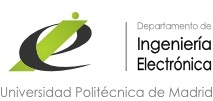Featured events
| Mon | Tue | Wed | Thu | Fri | Sat | Sun |
|---|---|---|---|---|---|---|
| 1 | 2 | 3 | 4 | |||
| 5 | 6 | 7 | 8 | 9 | 10 | 11 |
| 12 | 13 | 14 | 15 | 16 | 17 | 18 |
| 19 | 20 | 21 | 22 | 23 | 24 | 25 |
| 26 | 27 | 28 | 29 | 30 | 31 |
Ph.D. in Electronic Systems Engineering (RD 99/2011)
Welcome to the main information page of on the Doctorado en "Ingeniería Sistemas Electrónicos" (DISE).
This PhD program is the heir to the Doctorado en "Sistemas Electrónicos" (DSE) that obtained the "Seal of Excellence" awarded by ANECA on October 6, 2011, and valid until the 2013-2014 academic year. This program is also the heir to the PhD program of "Electronic Systems Engineering for Intelligent Environments" (ISEEI) , which was awarded the Seal of Quality by the Ministry in 2005-2006, which was renewed in the 2006/2007, 2007/2008 and 2008/2009 academic years (Resolution of 20 October 2008 ofthe Secretary of State for Universities).
The doctorate program Doctorado en "Sistemas Electrónicos" (DSE) was initiated by the Department of Electronics Engineering (DIE) at the Higher Technical School of Telecommunications Engineering (ETSIT), at Polytechnic University of Madrid (UPM). The field of the graduate study program covers the subjects of Electronics Engineering and Technology, including others that are support and requirements for applications development, systems and services for future intelligent environments.
Despite its origin, this program has the participation of teachers from other Centers and Departments. Specifically:
- Institute of Optoelectronic Systems and Microtechnology (ISOM), of UPM.
-
The following departments of ETSIT-UPM:
- Department of Signals, Systems and Radiocommunications
- Department of Applied Mathematics to Information Technology
- Photonics Technology Department
- Department of Applied Physics to Information Technology
- Department of Electronic Systems and Control, of the University School of Technical Engineers of Telecommunication (EUITT), UPM
- Polytechnic School of Higher Education, UPM
- School of Informatics, at the University of Castilla La Mancha
The program also includes the collaboration of professors and researchers from other national centers (University of Alcalá, Institutes of Materials Science and Microelectronics of CSIC, The Reserch and Development Center of the Navy, National Institute of Aerospace Technology, Gregorio Marañón Hospital, etc.) and foreign institutions (Paul Drude and Walter Schottky Institutes, Technical Universities of Berlin and Munich, respectively, among others) and several companies (Telefónica R&D, Vodafone Foundation) and other organizations (COIT).
The postgraduate activities in this program are grouped together into the areas of Research into Devices and Microelectronic Technologies, Opto-electronics, Microsystems, Design and Testing of Circuits and Electronics Systems, Processing Architectures and Tools and Software Components, Biomedical Systems, Speech Technology, Services based on Wireless Communications and Automation.
This program has been designed so that it brings together the extensive experience of research that the Department of Electronic Engineering has accumulated since 1974, at the same time focusing on research targets for Smart Environments. (Ambient Intelligence in the terminology of the VI Framework Program of the European Union), which will lay the foundations for the future Graduate programs to be carried out under the Bologna process.

